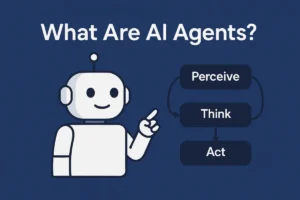When the agents shed their shadows and don headsets, they won’t control us—they’ll collaborate.
Have you ever wondered how Alexa knows when to dim your lights or how a self-driving car decides when to stop? Behind the scenes of these intelligent tasks is something called an AI agent—a smart little system that can sense, think, and act. As artificial intelligence becomes a part of everyday life—from shopping apps to personal assistants—understanding what these agents are will help you better navigate this fast-changing world.
🔍 1. What is an AI Agent? (Simple Definition)
An AI agent is a software or machine-based system that can:
-
Observe its environment (like hearing your voice)
-
Make decisions based on data or goals
-
Take action to achieve a task (like playing a song or sending a message)
Think of it like a smart helper that doesn’t just follow instructions—it figures things out for itself.

🕰️ 2. A Quick Look at the History
The concept of AI agents goes back to the 1950s when early computer scientists imagined machines that could mimic human reasoning. Over time, agents evolved from simple rule-following bots to learning systems that adapt to your needs.
-
1956: AI was born as a field.
-
1980s: Intelligent agents appeared in expert systems.
-
2020s: AI agents now power smart homes, chatbots, self-driving cars, and even mission planners in defense.
🧠 3. Types of AI Agents (With Simple Examples)
| Agent Type | How It Works | Example |
|---|---|---|
| Reactive Agent | Acts based on current input | A robot that stops when it sees a wall |
| Goal-Based Agent | Chooses actions to reach a goal | Google Maps finding the shortest route |
| Utility-Based Agent | Chooses the best option | Netflix recommending a show you’ll enjoy |
| Learning Agent | Improves from experience | ChatGPT getting better over time |
These types can be mixed and matched depending on how complex the task is.
💡 Real-Life Example: Your Phone’s Voice Assistant
Let’s take Google Assistant. When you say, “Set a timer for 10 minutes”, it:
-
Hears your voice (perception)
-
Understands your request (processing)
-
Triggers the timer app (action)
This is an AI agent at work—a little piece of software acting intelligently on your behalf.
🎨 Visual Element: How an AI Agent Works

🎯 Try It Yourself: Prompt to Test ChatGPT as an Agent
✨ Prompt:
“You are my smart travel planner. I want to go on a 5-day trip to Himachal on a budget. Suggest itinerary, food, and travel options step-by-step.”
See how it collects your request, reasons about options, and gives a plan? That’s an AI agent in action—just in a chat window.
🧾 Closing Takeaway
AI agents aren’t science fiction anymore—they’re all around us, working silently in our phones, homes, cars, and even hospitals. They’re the building blocks of the AI future, helping machines act more human-like. Whether you’re tech-savvy or just curious, understanding AI agents is the first step to making sense of how intelligent systems shape your world.
🔗 Next Blog in the Series:
👉 How AI Agents Actually Think: From Goals to Actions (Coming soon!)
Also Read:
Top 10 SDKs & Frameworks to Build Powerful AI Agents in 2025
Important Links:
1. What are Autonomous Agents? – Introduction to LLM Powered Agents: https://www.youtube.com/watch?v=n_31i1J195w – This video provides a good introductory overview of autonomous agents, particularly in the context of Large Language Models (LLMs). It’s great for grasping the fundamental concepts.
2. LangChain Explained in 5 Minutes: https://www.youtube.com/watch?v=AY9OU36_73w – While focusing on LangChain, this video clearly explains how agents work within that framework. LangChain is a popular tool for building agents, so understanding its agent capabilities is very helpful.
3. Building Autonomous Agents with Python and OpenAI – Full Course: https://www.youtube.com/watch?v=AaF-ezm-YMY – If you’re looking for a more in-depth understanding and want to see agents in action, this full course walks you through building them using Python and OpenAI. It’s a more hands-on approach.
4. The Rise of AI Agents: A New Era of Automation: https://www.youtube.com/watch?v=rmVRLeJRklY – This video offers a broader perspective on the impact and potential of AI agents in automation. It’s useful for understanding the bigger picture and future implications.
5. AI Agents: The Next Big Thing? (feat. Harrison Chase): https://www.youtube.com/watch?v=oSQg8vs1F_k – Featuring Harrison Chase, one of the key figures behind LangChain, this video provides insightful discussions about the current state and future of AI agents. It offers a more expert perspective.
Important Guides to study Agents
1. Research & Overview
- AI Agents Explained (Stanford) – A breakdown of AI agents by Stanford’s Human-Centered AI Institute.
- Multi-Agent Systems (MIT) – Research on collaborative AI agents from MIT.
2. Technical Guides
- AI Agents in Reinforcement Learning (DeepMind) – Papers on how agents learn through reinforcement.
- Building Autonomous Agents (LangChain) – A guide on coding AI agents using LangChain.
3. Industry Applications
- AI Agents in Business (McKinsey) – How enterprises deploy AI agents for automation.
- Autonomous Agents in Gaming (NVIDIA) – AI agents in simulation and gaming.
4. Open-Source Tools
- AutoGPT (GitHub) – A popular autonomous AI agent framework.
- Hugging Face Agents – Using transformers to create AI agents.
5. Ethics & Future Trends
- Ethics of AI Agents (Future of Life Institute) – Risks and governance of autonomous agents.
- The Future of AI Agents (a16z) – Venture capital perspective on agent evolution.
